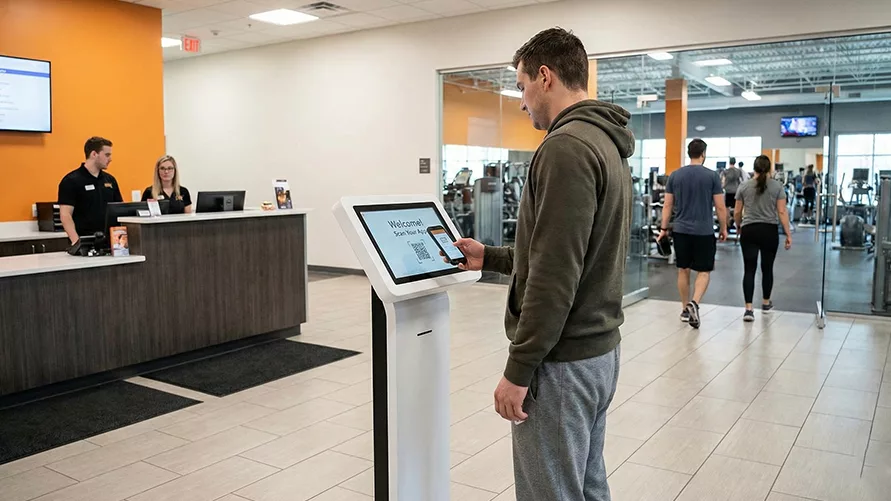Yes, they should. But only when there are clear rules, consent, and respect between gyms, instructors, and members.
That answer sounds simple. But the truth? This is one of the hottest debates in fitness today. Why? Because gyms are no longer just four walls filled with weights. They’re communities. And instructors? They’re the heartbeat of these communities. They bring life to every class, every set, every rep. People don’t just follow a workout; they follow a person. They follow a voice they trust.
When an fitness instructor starts building their own brand, it’s like turning on a spotlight. Suddenly, there’s attention, excitement, and a personal touch. But that spotlight can also create shadows, confusion, mistrust, and sometimes conflict. So, should gyms allow it? Should instructors email class participants to stay connected? Let’s break it down together.

Why this topic matters for gyms and instructors
Gyms need instructors. Instructors need gyms. But here’s the real kicker: members often come for the gym but stay for the instructor. A 2023 IHRSA report found that 74% of gym-goers stick around because of the instructor, not the equipment. That shows how powerful instructors are in member retention.
Now, think about the modern fitness world. Social media is huge. Branding is everything. Instructors are influencers in their own way. People follow them on Instagram, watch their YouTube workouts, and ask for tips on TikTok. So, when an instructor builds a brand, they’re not just growing themselves; they’re also bringing more eyes to the gym.
But without clear policies, this can create a storm. Who owns the client relationship: the gym or the instructor? What happens if the instructor leaves? Does the gym lose members, too? That’s why this topic is so important. It’s not just about branding; it’s about business survival and trust.
The potential benefits and risks for both parties
Let’s start with the good stuff. When an instructor builds a strong brand, everyone wins. They attract more members. They make classes exciting. They create buzz on social media. A 2024 survey showed instructors with personal branding on social platforms had 30% higher bookings than those without. That means more traffic for the gym.
For the instructor, branding is a career move. It opens doors for workshops, online classes, and sponsorships. It builds authority. It makes them a trusted voice in fitness.
Now, the flip side. Risks are real. If an instructor emails class participants without consent, it can feel intrusive. Members might wonder,
“How did they get my email?”
That breaks trust fast. For the gym, this can look bad. It raises privacy concerns. Worse, what if an instructor uses emails to promote their own private sessions outside the gym? That’s a direct hit to the gym’s revenue.
And then there’s loyalty. If a star instructor leaves and takes members along, the gym suffers. That’s why gyms fear giving too much control to instructors. It’s a delicate balance.
The financial reality for gyms and instructors
Here’s where the money talk comes in. A single star instructor can influence 50–100 members. If they walk out and take those members along, the gym could lose $20,000–$50,000 annually in membership fees. Add another $5,000–$10,000 to hire and train a replacement. That’s no small hit.
On the instructor’s side, personal branding sounds like a goldmine: private clients, online classes, sponsorship deals. But leaving a gym too early can backfire. You lose a steady income. You risk breaching contracts. You even risk lawsuits over client data.

So, what’s the solution? Partnership or pay hike. Instead of seeing branding as a threat, gyms can flip it into an opportunity. Offer instructors revenue-sharing on premium classes or co-branded workshops. It’s a win-win: the gym gets extra revenue streams, and the instructor earns more without leaving. Another option? Performance-based salary hikes tied to class attendance, social engagement, or retention metrics. This makes instructors feel valued—and keeps their ambition aligned with your business.
The truth? Branding can be a revenue booster for both parties, but only if done right. Gyms that partner with instructors for co-branded classes or workshops often see 20–25% higher retention and new revenue from premium programs. That’s real money on the table.
Ethical and contractual implications
Privacy is non-negotiable. Member emails are personal data. In many regions, laws like GDPR (in Europe) or CCPA (in California) require explicit consent for marketing. If instructors send emails without permission, they could break the law, and the gym could be held liable, too.
Contracts need clarity. Some gyms state that client lists belong to them. Others share access under conditions. If the contract is silent, it’s a gray area. That’s dangerous. Both parties need to agree:
- Who owns the contact list?
- Can instructors email members for personal promotions?
- What happens if the instructor leaves?
Clear agreements prevent messy fights later.
Impact on member trust and retention
Members love personal connections. A friendly email saying,
“Great job today. See you next class.”
Feels warm. It shows care. In fact, research revealed that gyms that allow instructors to send consent-based personal emails see 15% higher retention rates in six months.
But there’s a dark side. If members feel their data is misused or they’re being pushed to leave the gym for private sessions, trust breaks. Once trust is gone, members don’t just leave; they tell others. That hurts the gym’s reputation big time.
So, the key is transparency. Members should know who’s emailing them and why. It should feel like support, not sales.
Best practices for gyms to manage brand, building efforts
Gyms shouldn’t block instructor branding. They should embrace it, but with structure. Here’s how:
First, create a policy. It should cover email use, brand promotion, and social media mentions. Example:
- Instructors can send messages only through the gym’s system.
- Emails must be about class updates or tips, not competing services.
- Use approved templates with disclaimers like: “Sent by your instructor via [Gym Name].”
Second, provide branding support. Let instructors shine under your brand umbrella. Feature them in newsletters. Highlight them on Instagram. Offer co-branded content like workout tips or Q&A sessions. This way, the instructor grows, and so does your gym’s reputation.
How gym software can help with instructor, brand management
This is where tech steps in as the hero. Gym management system can make this whole process smooth and safe. Here’s how:
- Controlled Access: Instructors can email only members in their classes, not the entire database.
- Consent Tracking: The system checks if members have agreed to receive emails.
- Approval Flows: Instructors write the email. Gym staff reviews it. Then it goes out. No risks, no surprises.
- In-App Messaging: Many platforms let instructors send notes inside the gym app. Members stay connected without exposing private emails.
With software, branding becomes a team effort, not a tug-of-war. It keeps communication professional, personal, and private.
Final thoughts
So, should gym instructors be allowed to build their own brands and email class participants? Yes. If it’s done with respect, clear rules, and the right tools.
Branding helps instructors grow. It helps gyms stand out. It creates stronger bonds with members. But without boundaries, it can lead to mistrust and legal trouble. The smart move? Talk openly. Write fair contracts. Use modern gym software to keep everything clean and compliant.
When gyms and instructors work as partners, everyone wins. The instructor feels valued. The gym looks strong. And the members. The person who matters most. Feels supported every step of the way.





